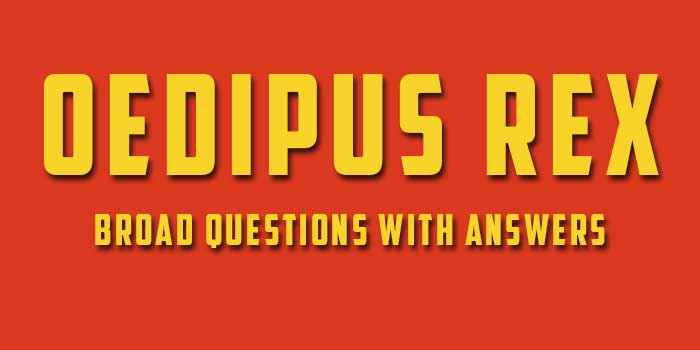Or,
What religious view of Sophocles is expressed in King Oedipus?
Or,
What is Sophocles’ tragic vision of life as apparent in the drama King Oedipus?
Ans. King Oedipus is regarded as Sophocles’ masterpiece, and the greatest of all Greek tragedies. The tragedy evinces the writer’s artistic excellence. It is dominated by the powerful figure of Oedipus. He is impetuous and proud, but despite his faults he is basically a good man. To a modem reader he does not seem to deserve the terrible punishment that is meted out to him. But Sophocles depicts in the drama what he believes from his religious view or metaphysical vision of man’s life in the universe.
Sophocles believes that man must accept the responsibility for his acts and their consequences, as does Oedipus at the end of the drama, regardless of his original motives and inability to control or understand the forces which rule his life. The sole opportunity for man to attain heroic stature and true nobility lies in this humble yet courageous moral acceptance. These are the things that give real value to a man’s life.
The great tragedian believes that there is a harmonious purpose guiding the universe, though human beings might not be able to comprehend it. He visualizes a cosmic order that controls all things, and circumscribes the areas of human endeavour. It strikes down all who strive to cross the boundaries set for humans. But the dynamic acceptance of this order is far removed from ‘passivity or pessimism; it postulates a higher meaning of life than man can see. It demands that the universe must finally react to man, and man must Submit to the universe, within a process of eternal correlation.
From the Sophoclean vision man has free will, but he exists within a system of limitations on his activity. These limitations weave a network of circumstances that are unbreakable. These circumstances seem determined by fate which is constituted of heredity and environment, chance, or God’s inscrutable will. But man ultimately chooses his own deeds and bears the responsibility for them. Each choice predetermines the one that follows, but man can break the chain of circumstances at any point and strike out in a new directiOn. The events in King Oedipus are contrived to illustrate the underlying relationship of all things within the cosmic order. They emphasize Sophocles’ conviction that life is not chaotic, even though it is often cruel Oedipus’ innocent motives, Sophocles shows, are not enough to absolve him. He could have pondered more fully the meaning of the oracle, and been cautIous in the presence of older people. He could have more thoroughly looked into the rumours about his birth while still in Corinth, or investigated the unexplained death of his predecessor, Laius, after he became the king of Thebes. In the final analysis Oedipus was guilty, but his real sin was not killing his father or marrying his mother, since he did them unwillingly. His real sin was his presumptuous attempt to raise himself to the level of the gods—he tried to circumvent, the divine will as revealed by Apollo’s oracle.
Sophocles’ scheme of things, it seems from the drama, is that the way to human happiness is through reverence and humility. The purpose of man’s existence is to achieve the highest possible individual development within the limits set by the gods. Manshould attempt to understand and adhere to the divinely ordained laws. He should gracefully accept the restrictions of the human condition, and take on the responsibility for all his actions.
Within the short compass of a tragedy, Sophocles has conveyed this profound vision of the universal order, man’s relation to it, his duty to God, and his obedience to His will.




